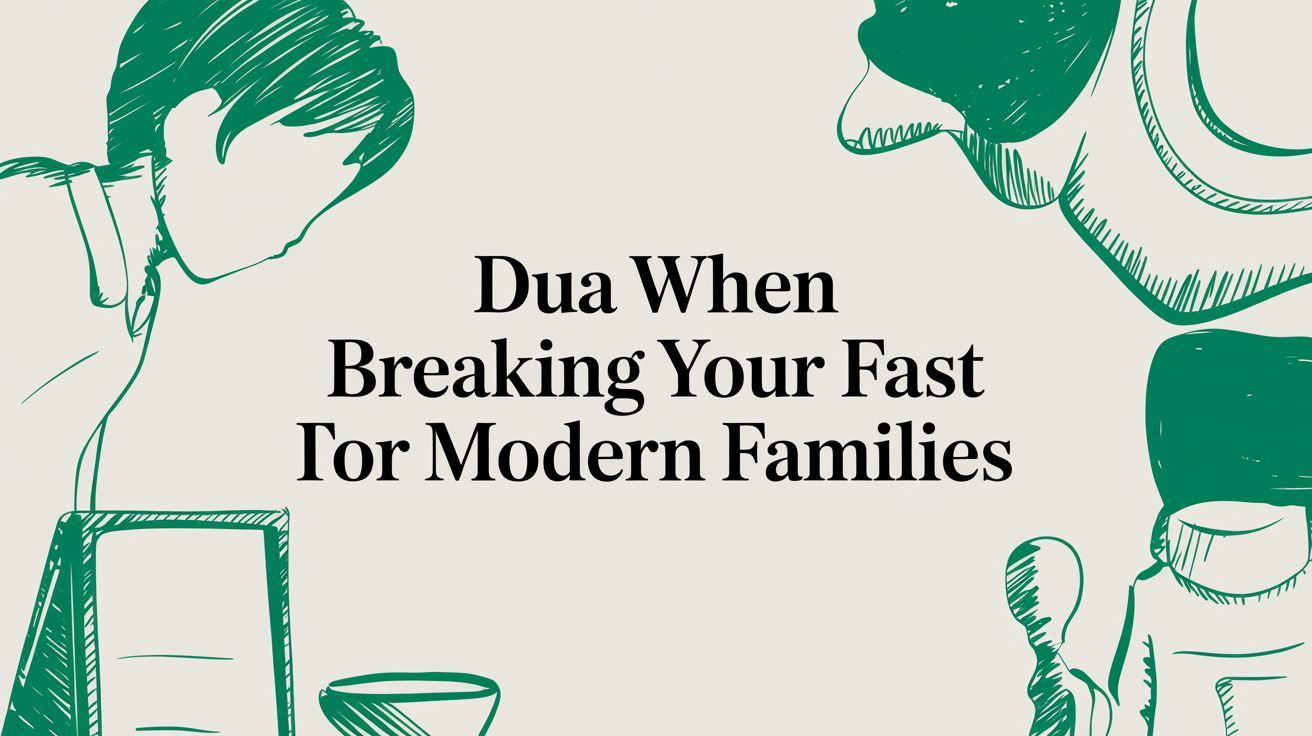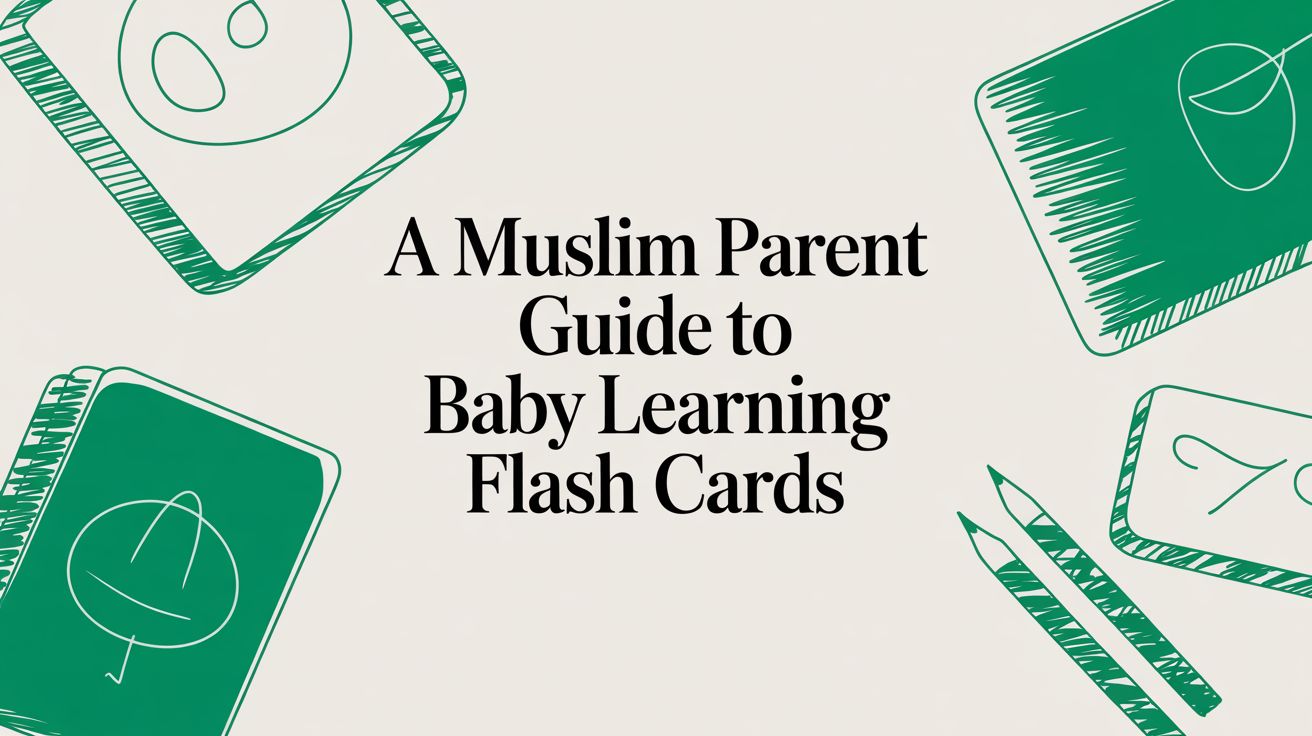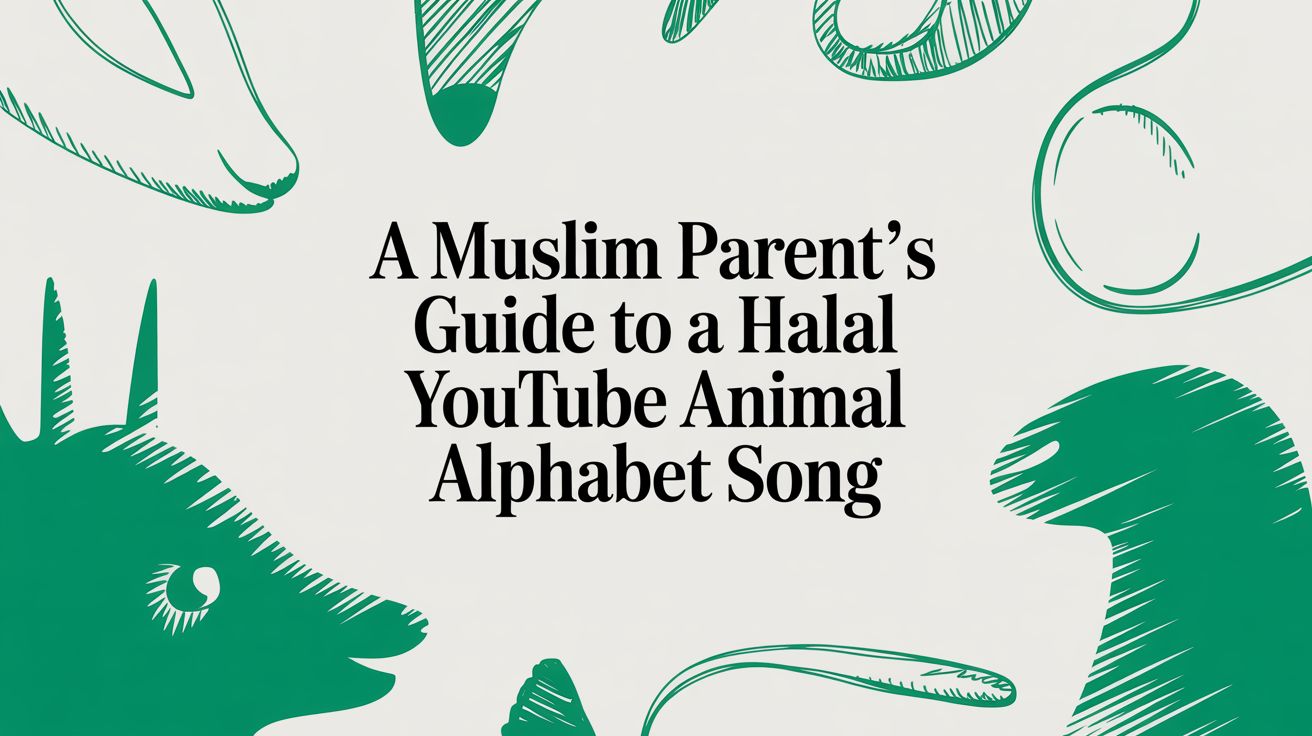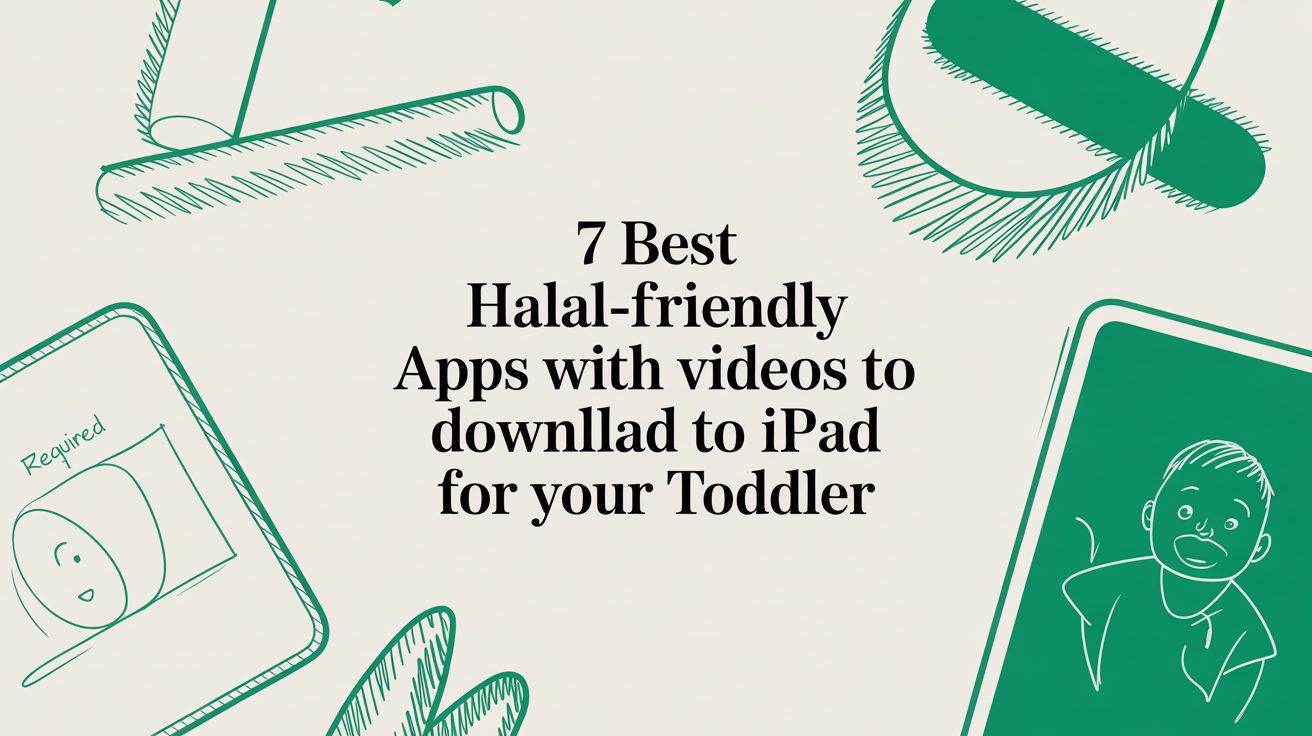When it's time to break your fast, there's a specific dua that's most commonly recited. It's a beautiful, simple prayer of gratitude to Allah, said just as you take that first sip of water or bite of a date at Maghrib. It's a powerful moment, marking your appreciation for the strength He gave you to complete the day's fast.
Your Go-To Guide for the Iftar Dua
Let's be real—those few minutes before the Maghrib adhan can be pure chaos. You might have a toddler attached to your leg, the dates are still in the cupboard, and you're trying to pour water without spilling. In these precious, busy moments, knowing the iftar dua by heart can bring a sense of peace and connect you right back to the purpose of it all.
This simple prayer transforms the physical act of eating into a deeply spiritual one. It's a tradition that grounds your family's iftar in gratitude, even when the little ones are far more interested in their food than the prayer itself.
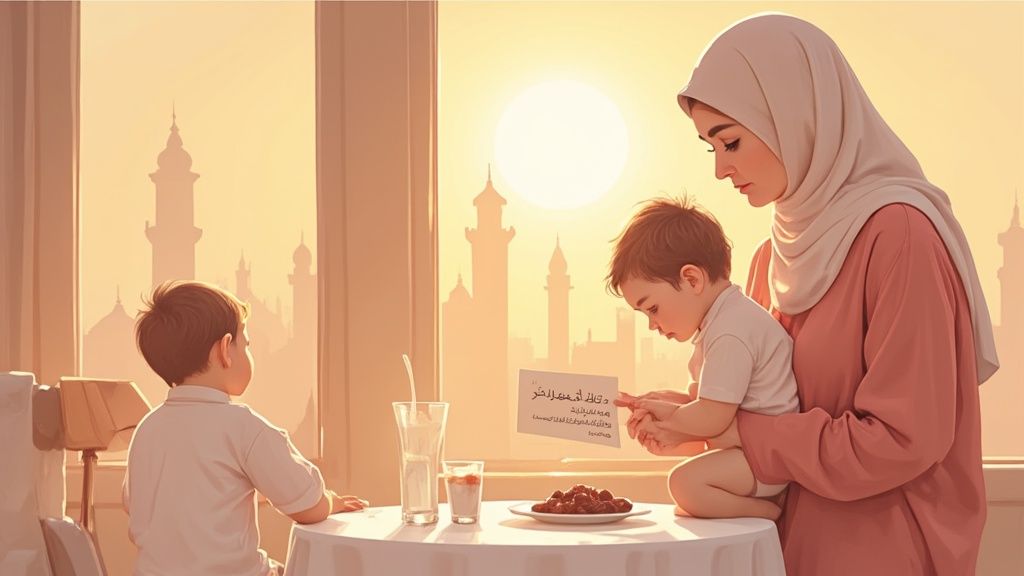
The Dua at a Glance
For those moments when you just need a quick reminder, here’s a simple breakdown of the most widely recited dua for breaking the fast.
Quick Guide to the Iftar Dua
This table breaks down the most common supplication for breaking your fast, making it easy to recall during those busy moments right before Maghrib.
| Format | Dua Text |
|---|---|
| Arabic | ذَهَبَ الظَّمَأُ وَابْتَلَّتِ الْعُرُوقُ وَثَبَتَ الأَجْرُ إِنْ شَاءَ اللَّهُ |
| Transliteration | Dhahaba al-zama’ wa abtalat al-‘urooq wa thabata al-ajr in sha Allah |
| Simple Meaning | The thirst is gone, the veins are moistened, and the reward is certain, if Allah wills. |
This supplication beautifully captures that feeling of relief and hope after a long day. It acknowledges the physical replenishment and affirms our hope for spiritual reward from Allah.
During Ramadan, Muslims abstain from food and drink from dawn until sunset. That can be a long time! To put it in perspective, around the middle of Ramadan 2025, the fast in Oslo, Norway, will last for nearly 14 hours. You can explore more about global fasting times on Statista.com.
Remember, the goal isn't perfection, especially with babies and toddlers. Just reciting these words with sincerity is what fills your home with blessings. It’s all about creating positive, faith-filled memories, much like how we carefully choose other influences in their lives. For more on that, you might find our guide on navigating popular cartoons like Peppa Pig helpful.
The Meaning and Story Behind the Dua
Every prayer we teach our kids has a story behind it, and the one for breaking the fast is especially sweet. It’s more than just a set of words; it’s a direct link to the way Prophet Muhammad (peace be upon him) did things, tying our little family iftar right into centuries of tradition. This prayer perfectly captures that special feeling of relief and hope when the sun finally sets.
Think about that moment after a long day of fasting. That first sip of water is just pure bliss. This dua gives voice to that exact feeling. It acknowledges that the physical challenge is over, but just as importantly, it shifts our focus to the spiritual reward we’re hoping for from Allah.
It’s a powerful idea to share with our little ones as they begin to understand: we’re grateful for the food that strengthens our bodies and hopeful for the blessings that feed our souls.
A Prayer of Hope and Relief
The most common version of the dua, "Dhahaba al-zama’…," is more like a declaration than a request. It’s a statement of gratitude and confidence in what Allah has promised.
- "The thirst is gone..." This is about the immediate, physical relief we all feel.
- "...the veins are moistened..." What a beautiful image! It paints a picture of our bodies being nourished and taken care of.
- "...and the reward is certain, if Allah wills." This is the heart of the prayer—a simple, powerful expression of faith and hope in Allah's mercy.
When we say these words, we're not just reciting a prayer. We're echoing the very practice of the Prophet (PBUH) and bringing his Sunnah to life in our own homes.
Different Words, Same Heartfelt Meaning
You might have come across slightly different duas for breaking the fast, and that’s perfectly fine. It's good to know that other beautiful variations exist, and every single one is a valid and sincere way to thank Allah.
The real point is the same no matter which words you use: to pause for a moment, recognize Allah as the One who provides for us, and express our gratitude for His blessings. That simple act of thanks is what truly counts.
This beautiful tradition of saying a dua at iftar brings families and entire communities together all over the world. It’s a shared spiritual moment that connects a huge and growing global family. Islam is, after all, the world's fastest-growing religion, with nearly 2 billion followers, and this shared practice is a powerful symbol of that unity. You can read more about this remarkable growth from TMJ News.
Ultimately, knowing the ‘why’ behind the dua turns it from a routine into a truly meaningful ritual. It helps us feel closer to our faith and gives us a wonderful story to share with our kids, planting the seeds of love for these precious traditions deep in their hearts.
Creating a Calm Iftar Routine with Little Ones
Let's be honest: how do you find a moment of peace to make a heartfelt dua when breaking your fast with a hungry, restless toddler in the room? That pre-iftar rush is a real thing. But with a little bit of planning, you can turn what feels like a chaotic countdown into a calm, shared spiritual moment for the whole family.
The secret is getting as much done as you can before the Maghrib adhan begins. This isn't about setting up a picture-perfect table, but about lowering your own stress levels so you can actually be present. When you're calm, your little one picks up on that energy.
Setting the Scene for a Peaceful Iftar
Try to have everything in place just before that beautiful call to prayer fills your home. This small head start can make a world of difference.
- Get the Plates Ready: Have your child’s food already portioned out and cooled down on their highchair tray or at their small table. A hungry toddler with food ready to go is a much happier toddler than one who is watching you scramble.
- Let Your Toddler "Help": Ask them to get involved! Even a one-year-old can "help" put the dates on a special plate. This simple task makes them feel like a big part of the tradition and teaches them the rhythm of iftar.
- Take a Deep Breath Together: As soon as you hear the adhan, pause. Gently say, “Listen, it’s time for iftar,” and take a slow, deep breath yourself. This little action acts as a cue, signaling a shift from the day's hustle to a moment of peace.
Following the Sunnah, the most beautiful way to break the fast is with dates and water. This isn't just a tradition; it's also incredibly gentle on an empty stomach. The perfect time to recite the dua is right after that first sweet bite of a date or the first refreshing sip of water. It's a moment of pure, focused gratitude.
This brief pause—for a date, a sip of water, and a quiet prayer—is the real heart of the iftar routine. It re-centers everyone on thankfulness before the main meal begins, anchoring the moment in spirituality rather than just the food.
Making the Moment Meaningful
Remember, your baby or toddler is learning by watching everything you do. When they see you pause, close your eyes, and whisper a prayer, they absorb the importance of this ritual, even if they don't understand a single word. You're planting the seeds for their future love of Ramadan.
Building these small, consistent routines helps your child understand what to expect next, which is incredibly comforting for them. This sense of predictability is a cornerstone of healthy development, much like how cause-and-effect toys teach them about actions and reactions. You can explore more about this in our guide to the best cause-and-effect toys for early development.
The goal here is simple: build a positive, loving association with this blessed time. You're turning what could easily be a stressful rush into a cherished family memory, one date at a time.
Sharing the Iftar Dua with Your Baby and Toddler
This is where the real magic of Ramadan memories begins. Introducing the dua for breaking your fast to your little ones isn't about rote memorization or getting the pronunciation just right. It's about inviting them into a beautiful moment of gratitude, letting them feel the warmth and togetherness of this special family tradition.
For babies, it’s as simple as letting them hear your calm, gentle voice as you recite the dua. They are soaking in the peaceful atmosphere you create around iftar time. Your voice becomes a familiar sound of comfort and love, building a foundation of positive feelings long before they can even grasp the words.
With toddlers, you can start making it more interactive and playful. Remember, the goal here is connection, not perfection.
Making the Dua Fun and Accessible
The trick is to introduce simple, repeatable actions that your toddler can join in with. This helps them feel included and gives them a small, important role in the family’s iftar ritual.
- Simple Words: Focus on just one key word. As you recite the full dua, you can gently encourage them to say "Allah" along with you. It’s a powerful and easy word for them to grasp and repeat.
- Hand Gestures: Little ones love actions! A simple gesture, like raising both hands in front of them as you say the dua, works wonders. They'll quickly learn to mimic this physical cue, which signals that it's a special time for prayer.
- Turn It into a Song: You can try chanting the first few words of the transliteration in a soft, melodic way. A simple tune like, "Dhahaba al-zama'..." can make the sounds familiar and fun for them to hear each evening.
This visual chart shows how a simple, predictable routine can create a calm transition to breaking the fast.
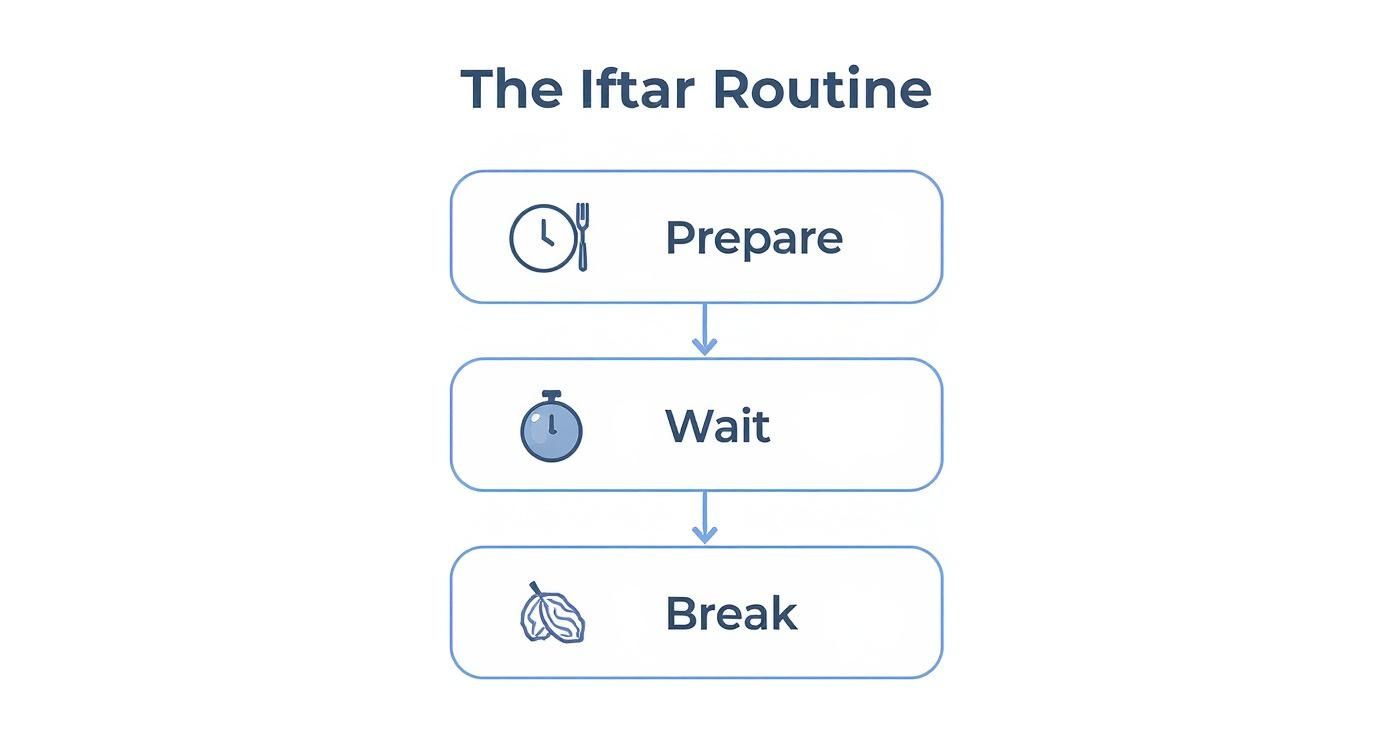
The key takeaway here is that predictable steps help a young child feel secure. They learn to understand that a quiet moment of gratitude comes right before we eat.
Age-Appropriate Ways to Introduce the Iftar Dua
Here are some practical and gentle ideas for sharing the dua with your child, from infancy to toddlerhood. The aim is to build a positive and loving connection to this beautiful Ramadan practice.
| Age Group | Gentle Approach | Simple Activity Idea |
|---|---|---|
| Infants (0-12 months) | Focus on sound and atmosphere. | Recite the dua in a soft, calm voice while holding your baby. Let them associate your voice and the words with comfort and peace. |
| Young Toddlers (1-2 years) | Introduce a simple physical cue. | As you say the dua, raise your hands together. Encourage them to copy you. Their participation, no matter how small, is a win! |
| Older Toddlers (2-3 years) | Try word association and repetition. | Focus on one easy word from the dua, like "Allah," and make it a fun game to say it together right before taking the first bite of a date. |
Ultimately, it’s about making the experience feel special and full of love, which is far more important than perfect recitation at this age.
Creating Positive Associations
The environment you build around iftar is just as important as the dua itself. You want your child to feel the joy and peace of this moment, creating a positive emotional imprint that will last for years.
Remember, you are planting a seed of love for Ramadan in their heart. Your gentle, consistent efforts—a soft voice, a shared date, a simple hand gesture—are the water and sunshine that will help that love grow, inshaAllah.
Visual cues can also be wonderfully effective. Something as simple as a special Ramadan-themed placemat that only comes out at iftar time can signal that this meal is different. It helps mark the occasion in a way a toddler can see and understand.
As you build these beautiful traditions, it's also helpful to have resources that support your family's values during other parts of the day. For screen time that is both engaging and faith-aligned, you can explore some great options in our guide to finding wholesome Islamic content on YouTube Kids.
Unlocking the Blessings of Dua at Iftar
In the beautiful chaos of family life, especially when you're juggling little ones' dinner and bedtime routines, the spiritual side of Ramadan can sometimes feel just out of reach. But the dua you make when breaking your fast isn't just another task on your to-do list; it's a precious gift. That very moment, right before you take your first sip of water, is one of the most powerful times for your prayers to be accepted.
Think of it as having a direct line to Allah, one that opens at the very peak of your patience and devotion. It’s a golden opportunity to pour your heart out for your children, your family’s health and well-being, and your own spiritual needs.
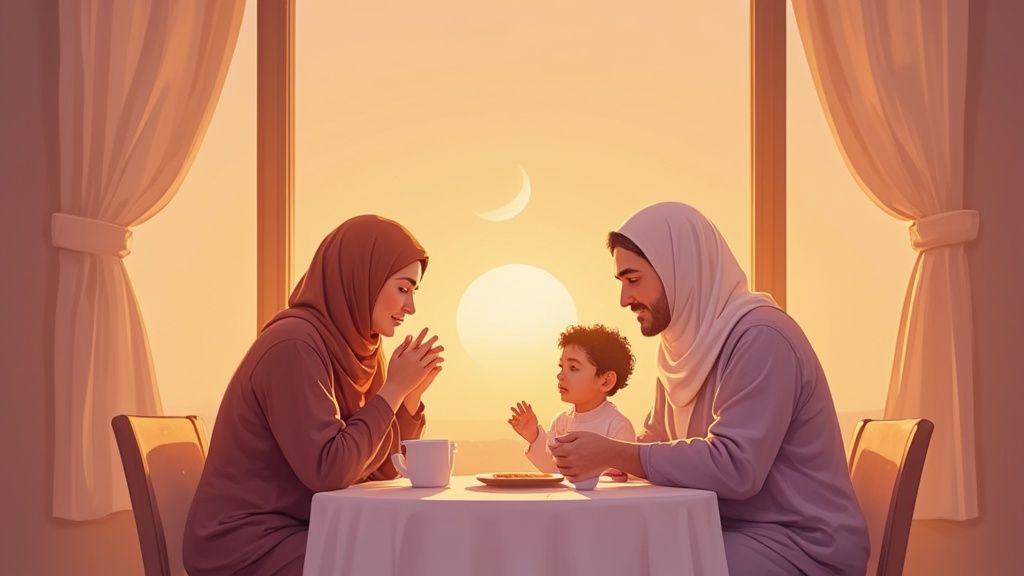
A Moment of Powerful Connection
The Prophet Muhammad (peace be upon him) taught us that the prayer of a fasting person at the time of breaking their fast is never rejected. This isn't just a hopeful saying; it's a profound promise of Allah's closeness. Your entire day of sacrifice and patience culminates in this single, blessed window of opportunity.
This is what makes the timing and ritual of breaking the fast so spiritually significant. The World Health Organization's regional office even highlights how abstaining from food and drink from dawn to sunset is a core practice of Ramadan, a month centered on health consciousness and generosity. The dua marks the sacred moment this prolonged fast ends and nourishment resumes. You can learn more about Ramadan's global health context from the WHO.
Nourishing Your Soul and Your Home
When you're managing meals, naps, and everything in between, it’s easy to feel like you're missing out on that deeper connection. But these small, intentional moments of dua are exactly what bring immense barakah (blessing) into your home.
This brief pause for prayer nourishes your soul just as the food nourishes your body. It's a quiet act of self-care and spiritual replenishment that refuels you for the evening ahead.
Making a heartfelt dua for your baby’s future, for your family's protection, or simply for your own strength is an incredible act of worship. Your little one sees you turning to Allah in this moment of gratitude and relief, and they absorb the beauty of this tradition. This simple, consistent act teaches them that our sustenance—and our hope—comes from Him. It transforms your iftar from just a meal into a profound lesson in faith and thankfulness.
Your Questions About the Iftar Dua Answered
Ramadan with little ones is beautiful, but it definitely comes with its own set of questions. How do you weave in spiritual traditions when your entire day revolves around nap times and toddler snacks? Let's dive into some of the most common questions we hear about the dua for breaking the fast, with real-world answers that fit a busy parent's life.
What if I Forget to Say the Dua Before Eating?
It happens to absolutely everyone! The adhan goes off, you have a hungry toddler tugging at your sleeve, and you instinctively reach for a date or a sip of water. In the beautiful chaos of family life, forgetting the dua is completely understandable.
If you remember right after that first bite, just pause and say it then. If you don't remember until later, or even forget entirely, please don't feel guilty. Allah knows what's in your heart and sees the effort you're making to juggle parenting and fasting. A simple "Bismillah" (In the name of Allah) is always a perfect start. Your fast is valid, and your hard work as a parent is seen and valued.
Remember, Islam is a faith of ease, not hardship. Your role as a caregiver is a profound act of worship, and Allah’s mercy is endless, especially during Ramadan. The goal is a heartfelt connection, not flawless perfection.
Can I Make a Personal Dua at Iftar?
Yes, you absolutely can—and you absolutely should! This is one of the most powerful and highly recommended times to pour your heart out in prayer. The moment you break your fast is a window of time when duas are said to be especially beloved and accepted by Allah.
Right after you recite the traditional iftar dua, take a moment. It doesn't have to be long; even a few quiet seconds can be incredibly meaningful. Use this precious opportunity to ask for anything and everything you need for yourself, your children, and your loved ones.
- For your baby: You could ask for their health and protection, for them to grow up righteous and kind, or for them to have a happy heart.
- For your family: You might pray for blessings and peace in your home, for strength for your spouse, and for a strong family bond.
- For yourself: Don't forget your own needs. Ask for patience, for ease in your daily tasks, and for spiritual growth.
These quiet, personal conversations with Allah can become a massive source of comfort and strength, especially on those long, demanding days of raising young children.
How Do I Handle Iftar Invitations with a Baby or Toddler?
Getting an iftar invitation is lovely, but the thought of taking a baby or toddler can feel overwhelming. Their routines are so easily thrown off, and a new, busy environment can quickly lead to a meltdown. It is perfectly fine to put your child’s needs—and your own sanity—first.
If you get an invitation, here are a few gentle ways to approach it:
- Make a Brief Appearance: You don't have to commit to the entire evening. A great option is to arrive just before Maghrib, break your fast and pray with everyone, and then head home before your little one's bedtime routine kicks in.
- Bring a Comfort Kit: Pack a bag with their favorite snack, a familiar sippy cup, or a quiet toy. Having a few things from home can make a new place feel much safer and more comfortable for them.
- Politely Decline: It is also completely okay to say no. A simple, "Thank you so much for thinking of us! With the baby's schedule, late evenings are tough right now, but we hope you have a wonderful time," is both gracious and honest.
Any friends and family who are also parents will get it immediately. Protecting your child's routine and your own energy isn't selfish; it's smart. Ramadan is a marathon, not a sprint, and making it sustainable for your family is the key to a truly blessed month.
At Babymode, we get it. We believe that building a foundation of faith begins with gentle, joyful moments shared together. Our platform offers a safe, ad-free world where your little one can enjoy beautiful, halal content—from sweet nasheeds about Allah’s creation to simple stories about good manners—all crafted for their delicate hearts and minds.
Join the Babymode waitlist today and be the first to know when you can bring this peaceful, faith-aligned screen time into your home.
